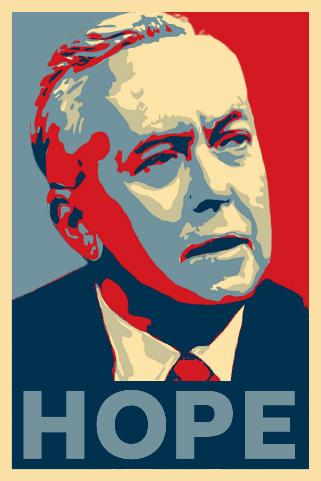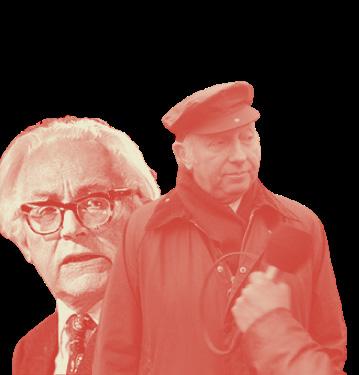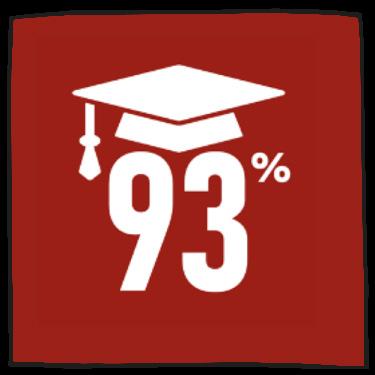
11 minute read
Danny Leach: The politics of hope
Danny Leach, PPE at Pembroke College
Hope is one of the single vaguest concepts in politics. It is a perfectly political term because it is perfectly malleable -wielded by whomever is worthy. It is rare that an election is won without someone in the commentariat claiming that the victors seized the mantle of hope. Whether we’re talking about Obama’s 2008 presidential campaign, the EU referendum, or even Boris Johnson’s “boosterism” in 2019, there is always someone willing to claim that victory went to those who promised something better. But when the world seems so depressing, the question of who gets to claim hope becomes more important than ever. It should be noted that elections are not always won on a tide of sunshine and feel-good music by D:ream. Elections are often won by safe pairs of hands and grey politics. This principle has proven itself time and time again: nobody could reasonably accuse Theresa May of running an upbeat campaign with an ambitious platform and she still hung on, if narrowly. As gratifying as Donald Trump’s defeat was, Biden winning was also really a demonstration of the desire of many in the electorate to make politics boring and normal. However, the circumstances must be entirely exceptional to win as an opposition candidate on a platform of business as usual; there is a good reason why incumbency is so powerful in politics. Of course, Labour is in power in one of the governments in the UK. Mark Drakeford in Wales is an almost perfect embodiment of the calm social democrat whom you might trust to look after your children’s schools and your grandma’s healthcare. But as the left languish in opposition and weakness across most of the West, socialists and social democrats with a serious record in government to leverage in their favour are in short supply. Those that have been in government over the past decade - a time when austerity was rife across the world - have little to celebrate or boast of in their record. Three of the four Merkel administrations in Germany have been propped up by the SPD, which even when governing alone in the early 2000s introduced the neoliberal Hartz IV reforms. PASOK managed to destroy themselves trying to implement EU cuts and the Socialist Party in France won a derisory 6.4% of the first-round vote in the 2017 presidential election. It would be easy to say that it is the ideological character of right and left that determine some iron rule where the left must advocate change and hope in order to actually win. After all, the Conservatives aren’t called that for nothing. If you defend a status quo, if you represent politics as it is, are you not small-c conservative by definition? Well, maybe. The sad reality is that the language of hope can be, and has been, co-opted by the right. There is no one archetype of a right-leaning politician who steals the clothes of hope. From David Cameron telling Blair “he was the future once” in 2005, to Boris Johnson and his promises of a post-Brexit land of milk and honey in 2016, they take many forms. In the good times, people will vote for incumbents, technocrats, or really anyone who can claim some part in the country’s success. In the bad, we want to believe there is something better to come, no matter who says it and no matter how they promise to do this. The politics of something so vague as hope could never be constrained by the detail of policy.
Advertisement
Perhaps the man to look to if we wish to understand hope is the one who literally made it his campaign slogan: Barack Obama. Undoubtedly, he is a more relatable figure to me personally and, I suspect, to anyone in Labour. Johnson’s appeal and charm has always eluded me and Cameron’s Boden-wearing, hoodie-hugging persona was plain strange. But watching Obama speak, the disappointments of his administration, the meekness of his policy, and his penchant for drone strikes all fall away. It is easy to be taken in, easy to believe in him. Personality is obviously important to being credible, credibility is important for translating policy into votes. If your local council can’t even fill in potholes in your area, why would you trust them to carry out major public works? Hope can only be delivered by someone both personable and credible. Labour can run a good, upbeat campaign. They might not win elections as often as we all would like, but when they have, it is because they inspired people to vote for a better future. Whether that was the fresh face of Harold Wilson after a long thirteen years of Tory rule or the simple pledges and feel-good inevitability of the 1997 landslide, Labour could claim to be the party of the future. In 2017 they could have once again claimed this mantle and very nearly did. Transformative policies, a slightly insurgent campaign, and a leader who most people still knew little about all contributed to that. However, the attempted rerun of 2017 flopped. As a prominent pollster said of Labour’s campaign: the souffle doesn’t rise twice. Clearly, even when you do everything ‘right’ it still doesn’t necessarily work. Labour did well when Corbyn appeared in person? Double his appearances! The policies were popular? Double their number and launch 15 separate manifestos! Probably the highest profile and most embarrassing example of this attempt to recapture a vibe was 2018’s Labour Live event, which aimed to recapture the spirit of Corbyn’s appearance at Glastonbury the year before. Having been initially priced at £30/head for adults, tickets were slashed and then given away through branches and union affiliates. The capacity was for 20,000 but only 3,000 tickets were sold, including those taken in the names of Leon Trotsky, Kim Il Sung, and Tony Blair (care of HMP Belmarsh). Clearly there is no tangible quality that can be extracted from one campaign or moment and injected into another. Then again, change is the iron law of politics. Corbyn would never have won the 1994 leadership election and an unreconstructed Blairite looks unlikely to be elected as Labour leader any time soon. The thing is, often who represents change and whether they will win is entirely out of the control of most of the political actors involved. Scottish independence looks much more attractive if you as a voter feel that your country has been condemned to managed decline. Under those circumstances, the SNP is the only party offering hope. Likewise, the factors that caused Brexit probably had little to do with many Brexiteers. Had David Cameron not cut services so viciously or had Thatcher and Major not failed to replace industry in this country, maybe 2% of us would not have preferred a leap into the dark to the status quo. In the end, it comes back to what Cameron said when he became Tory leader: what the future looks like changes all the time. No one person owns hope, just as no one political movement does. As hazy as the politics of hope may be, the one certainty when is this: hope wins elections. Without it, our chances of escaping the wilderness of opposition are all too low.

Toni Ledda, PPE at University College
It ought to be pretty uncontroversial to say that 2020 has been a horrible year. While disaster after disaster tore up the natural world and wreaked havoc on society, there were a few events this year for the Left to celebrate. Here are 10 of them:
1. Jacinda Ardern is one of the bigger success stories this year. Praised for her no-nonsense approach to the pandemic, the socially progressive leader became a beacon for change in New Zealand and an example of what female leadership can look like. Her Covid strategy in addition to her focus on the housing crisis, reducing child poverty, tackling climate change and social inequality led her to win an absolute majority of seats in the 2020 election - the first time this has been achieved since the country adopted a proportional representation system in 1996.

2. In the UK, pressure from the left as well as the general public forced the government to U-turn on policies that would have been incredibly damaging to lower-income people all over the country. One of the major instances was the A-Level fiasco where students who had been declared to have failed exams they never even took based on the past performance of their school, had their predicted grades restored. However, they also backtracked with the extension of the fur- lough scheme, as was heavily encouraged 40 times by the Shadow Chancellor Anneliese Dodds. Let’s not forget the people’s hero, Marcus Rashford, who headed the campaign to continue free school meals in the holidays, a lifeline for many in a time when food bank use has increased by around 300,000. These changes are a reminder that it’s still possible to influence policy change, even in opposition, when we campaign effectively and have the support of the public.

3. In a global series of policy changes, restrictions which prevented gay men from donating blood due to prejudice leftover from the AIDS pandemic were relaxed or have been recommended to be eased in the US, UK, Brazil, New Zealand, Uruguay, Australia, Denmark, France and Hungary. Although many of these countries have only reduced their deferral period rather than scrapped it all together, it’s a sign that the homophobia surrounding gay men donating blood is waning and hope that in the near future we may be able to remove restrictions completely.
4. A huge win for the left this year was the Biden-Harris win in the US Election in November. Trump became only the tenth President to serve just one term in office and the first to be voted out since the 1990s in the largest election turn-out the US has ever seen. It shows that fear-mongering and creating a cult of personality are not enough to keep in power when paired with absolute incompetence. It’s lovely to be able to talk of President Trump as an upcoming face of the past.
5. Argentina will become the fourth country in South America to legalise abortion (except for in life-threatening cases or cases of rape) after a bill passed through the lower house of government in December. Predicted to also pass through the Senate, this bill will save many lives and prevent suffering as well as set a precedent to other countries around the world. This is only a recent win in equal rights for the country whose president, Alberto Fernandez, has committed to furthering gender equality as well as political representation for the LGBTQ+ community in government.
6. Although the Black Lives Matter movement is still fighting for widespread improvements in racial equality and the abolition of the mass incarceration system, there’s no doubt that the ripples it caused around the world raised awareness for the movement’s aims and forced many people to consider their role in structural racial inequality. The movement has already succeeded in reducing police funding in many places in the US including Minneapolis and here in the UK it has made us question the privilege of Britain’s colonial past as well as the challenges faced by Black Britons today. In June, the statue of colonial merchant Edward Colston was toppled by protestors in Bristol and here in Oxford the Rhodes Must Fall campaign was successful in making the governing body of Oriel College vote for the statue to be removed. There is a long way to go yet, but small signifiers of change were a win this year. 7. The Crown came out this year, this was a win for the left in that it was not only extremely bingeable but caused outrage among the poshest of Conservatives by ex8. On a more serious note, widespread condemnation and awareness of the harm caused by gay conversion therapy have put pressure on governments around the world to ban the practice, following the Australian state of Victoria which banned it earlier this year. This included more than 370 religious leaders, including LGBT activist and South African cleric Desmond Tutu. In July, Boris Johnson promised that conversion therapy will be banned in the UK - the changing consensus in 2020 has offered hope


that it will be outlawed shortly. 9. The EU has met its 2020 targets for climate change that were decided by EU leaders in 2007. This includes a 20% cut in greenhouse gas emission, at least 20% of energy usage comes from renewable resources and a 20% improvement in efficiency. There’s a long way to go, but 2020 has shown us that we can still work while cutting our carbon footprint by moving some conferences, meetings online. The temporary changes we have made this year contributed to a 4% decrease in CO2 emissions.
10. We made it through this year. Surviving the shit show that is 2020 is an achievement in itself and something to be thankful for. We’re nearly at the end; congratulations everyone for gritting our teeth through it and

doing the best we can.








